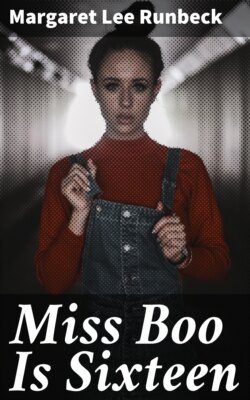Читать книгу Miss Boo Is Sixteen - Margaret Lee Runbeck - Страница 14
На сайте Литреса книга снята с продажи.
Apple Without Newton
ОглавлениеTable of Contents
If you must see apples growing, you have to find a good excuse to leave California. So, when we could bear it no longer, we went back to New England. On business.
We sat on a sunny stone wall under an applesauce tree, and we ate apples, loving autumn in the heart. The perfume of apples was in the air, and occasionally we heard the solid drumbeat of one falling in the orchard, without a Newton to marvel. Naturally we talked about apples as we munched ... that first one of Eve’s, the brave one of William Tell, the ones Robert Frost picked in his poem. We recited the homely names of strains we like best ... Russets, Grimes Golden, Baldwins, and Macintoshes. Those of us who preferred the crisp and tart lined up against the mealy and sweet.
We tossed the cores over our shoulders, then bit into another apple and opened the pearly pockets and saw the seeds. We said to ourselves, “Nobody ... no human eye ... has ever seen this seed before!”
We held the seed in our hand, polished as mahogany and warm as life itself, and we thought, This is one of the wonders of the universe. I can let it become nothing, in the crack of this stone wall. Or I can plant it and someday there will be another tree for friends to sit beneath on some distant Saturday morning.
Somebody said lazily, “An apple’s a wonderful thing. I was just thinking.”
“So was I,” the rest of us admitted.
“No matter where you happen to eat an apple, it always reminds you of home,” somebody said.
Then I remembered the American apple, and the Polish schoolmaster with whom I ate it.
This was long ago when I was a young student coming back to America after a fine holiday. I boarded the ship from a tender at Southampton, just before midnight. There was that carefree excitement you always feel when you get on a ship, waiting in the ocean for you to come and possess it. I ran fore and aft, exploring; I leaned on the rail and watched the lights rocking in the water, and the luggage coming on board. It was all exciting and fun, as if we were a large family of children moving into a new house.
I kept bumping into a dark-eyed little man, more delighted even than I, and more eager to see everything at once. He kept courteously apologizing and asking me questions, and I realized he had a new vocabulary of wobbly English he wanted to try out on somebody.
So we talked. We talked as if there never would be another night for talking. And this was how he actually felt, it developed, for he belonged in Third, and this was the only time he could have the run of the ship.
He was a teacher in a boys’ school in Warsaw, and he had been saving his money for ten years to visit America. He wanted to see everything, but particularly the place where Washington crossed the Delaware, which his boys liked to hear about. He had five weeks to spend ... and nearly $40.
“But I do not care to eat much,” he said hastily. “I want only to see.”
We talked and talked. Sometimes we came to the high wall of an unfamiliar word and could not climb over it to each other. He wanted to know about schools, about little boys’ camps, about free concerts for children. He wanted to know how we teach reading, and what gift his wife would most enjoy from America. He wanted to have his picture taken, and he wanted to see a cafeteria.
Then he decided to share something with me. “Now you must wait here, and I shall bring up something from below. A gift given to me because I am going to America.”
He disappeared, and I waited a long time, sleepy now, but not daring to be so rude as to leave when this was his only night.
He came back at last, his face pink from the long plunge down to Third. “Look ... here it is,” he said almost in awe. “An American apple.” He put it gently in my hands, a very weary apple from long being more than fruit to this man and his schoolboys. I could see it was a tangible pledge, a hostage from a dream at last come true.
“We shall eat it together, and you will tell me if it tastes like all American apples,” he said. Then he held it up for one last admiring look, and cut it in half.
He bit into it, and silently tested the taste. Then he nodded with satisfaction. Yes, America was going to be all that he had hoped for.
He was hilarious with enjoyment. He smacked his lips and snapped his eyes, and I, too, ate as lustily.
We tossed the halved core into the Atlantic darkness, and shared a moment’s silence.
“Well,” he said ceremoniously. “Now I have eaten an American apple. It is delectable. But it eats too fluently.”
I had not thought of the Polish schoolmaster for years. What is he doing now, behind the iron curtain? Whatever he is doing, I know an American apple stays fresh and sweet in his memory.
